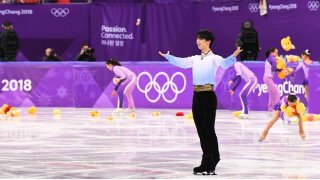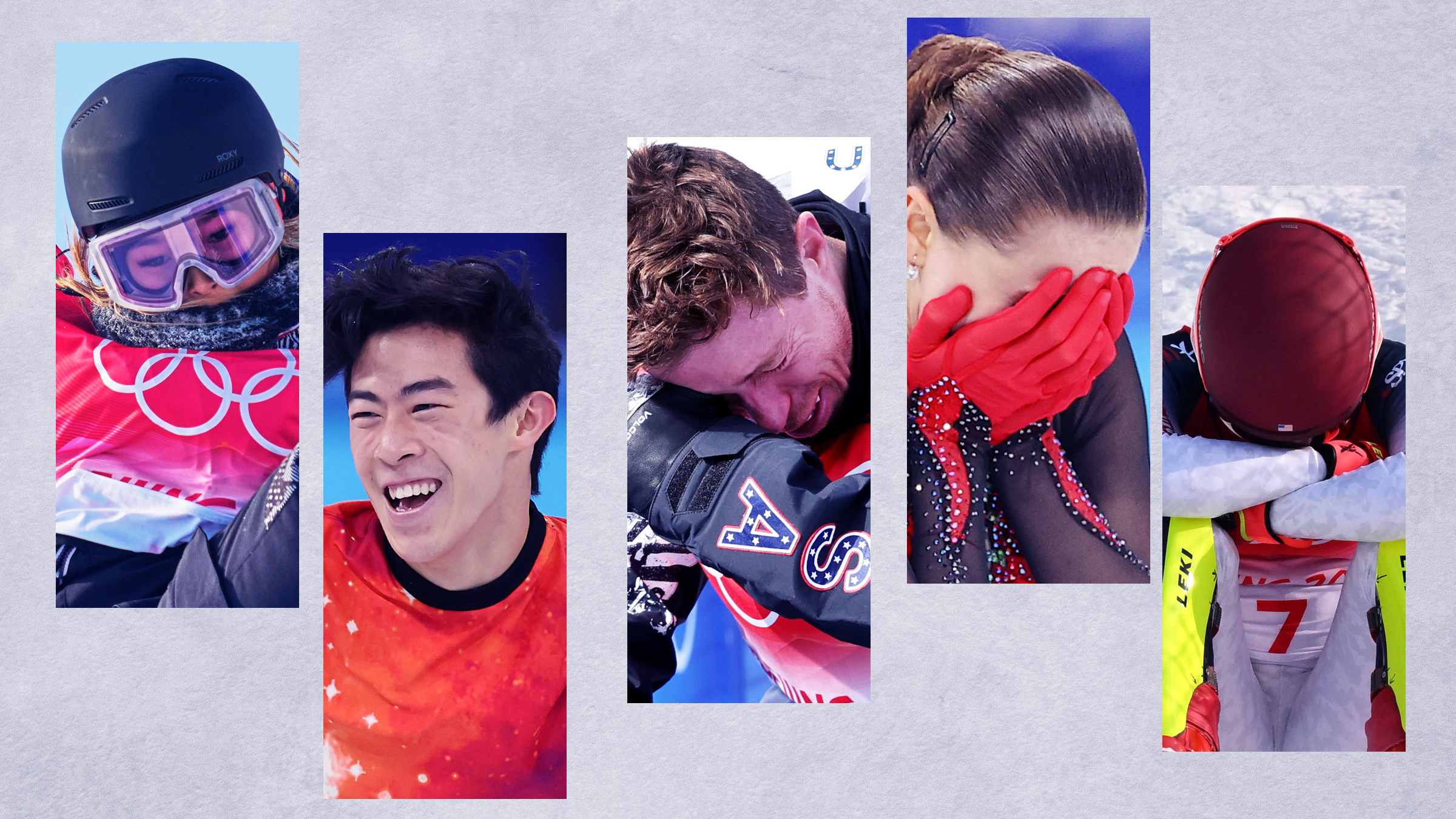
Yuzuru Hanyu (JPN) reacts as stuffed bears are thrown onto the ice in the mens figure skating short program during the Pyeongchang 2018 Olympic Winter Games.
The perfect reward for figure skating, one of the most elegant and classy sports is…stuffed animals?
Figure skating performances often end with rinks adorned with countless plush toys, thrown from behind the glass as fans in the stands show their admiration for the athletes. This is on full display at the sport’s biggest stage -- the Olympics.
How did this unique tradition come about? Read below to learn more about the history of gift giving in figure skating and what athletes do with these souvenirs.
When did the tradition of throwing stuffed animals begin?
Throughout much of the 1990s, flowers were the signature conclusion of figure skating, according to 1992 Olympic Champion Kristi Yamaguchi. That pairing came to an end in 2001 when U.S. Figure Skating banned flowers, citing debris and safety concerns “related to the Sept. 11 attacks and subsequent anthrax scares.”
While there is no universal ban on flowers, many other organizations have adopted the same position. Fans have adjusted to the decision, viewing stuffed animals as a unique opportunity to provide personalized gifts to some of their favorite athletes.
Who picks up the stuffed animals on the ice?
Beijing 2022 Winter Olympics
Watch all the action from the Beijing Olympics live on NBC
Every Olympics there is a fleet of young kids known as “sweepers” or “pixies” who are responsible for collecting the stuffed animals immediately after each performance. Figure skating’s version of “ball boys”, sweepers don’t keep the gifts but enjoy the opportunity of being in the midst of some of the sport’s greats.
In PyeongChang, this role was referred to as flower kids, dressed in coordinating purple uniforms. The group of 17 -- 16 girls and one boy -- were recruited from competitive skating programs throughout South Korea.
Get a weekly recap of the latest San Francisco Bay Area housing news. Sign up for NBC Bay Area’s Housing Deconstructed newsletter.
The flower kids gained considerable attention following Yuzuru Hanyu’s gold medal performance when they were charged with gathering hundreds of Winnie the Pooh toys, an homage to the Japanese skater’s good luck charm, dating back to 2010.
What do the athletes do with these stuffed animals?
Does Yuzuru Hanyu have a room dedicated to Winnie the Pooh? Unlikely.
Many of the athletes don’t even return home with these gifts, especially when competing in international competition, often choosing to donate them to various causes they care about.
In PyeongChang, Yuzuru confirmed that he’d be donating the gifts he received to local hospitals and charities, as he had done throughout much of his career. Meanwhile, American Jason Brown is known for partnering with the Ronald McDonald House to donate his gifts around the world.
Do figure skaters receive any other type of gift besides stuffed animals?
While stuffed animals are a staple of the sport, fans are known to get creative in showing their appreciation to their favorite athletes.
American Sean Rabbit earned a solid supply of alcohol when fans gifted him not one – but 12 – bottles of tequila following his performance to “Tequila.” He later joked that while that performance was fun, he had a hangover halfway through the season as a result of the many gifts he received from fans.
It doesn’t stop with alcohol. American Sasha Cohen once received a collection of cashmere sweaters while competing in Paris and Canadian duo Elvis Stojko and Patrick Chan reportedly were gifted lingerie.
Not every gift is as glamorous. Debi Thomas, the 1988 Olympic bronze medalist, received a box of Domino’s pizza, a gift she appreciated as being “more useful” than a bouquet of flowers.
Do the athletes keep any of their gifts?
While many gifts are donated, a special few tend to make it back in an athlete’s suitcase. Athletes are known to keep handwritten cards and specially designed gifts if possible.
Will athletes receive stuffed animals in Beijing?
Heading into the 2022 Olympics, it was unclear whether or not the limited number of spectators would be permitted to continue the stuffed animal tradition. While the Beijing Olympic Committee is yet to comment on the matter, there have been no signs of the rink littered with gifts.
That said, the Olympics are not completely void of plush toys.
Building on a tradition set in PyeongChang, medalists in Beijing receive a stuffed animal version of the Panda mascot, Bing Dwen Dwen, following their Olympic performance. Don’t worry though, the IOC isn’t skimping on the medals. These stuffed animals are just an addition to the Olympic memorabilia.




